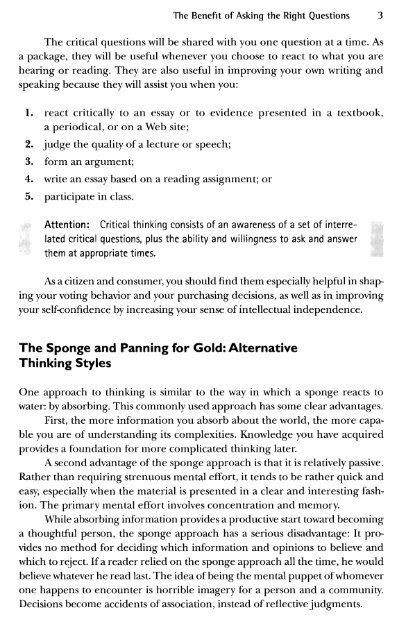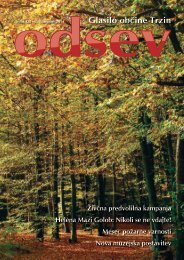Asking the Right Questions, A Guide to Critical Thinking, 8th Ed
Asking the Right Questions, A Guide to Critical Thinking, 8th Ed
Asking the Right Questions, A Guide to Critical Thinking, 8th Ed
You also want an ePaper? Increase the reach of your titles
YUMPU automatically turns print PDFs into web optimized ePapers that Google loves.
The Benefit of <strong>Asking</strong> <strong>the</strong> <strong>Right</strong> <strong>Questions</strong> 3<br />
The critical questions will be shared with you one question at a time. As<br />
a package, <strong>the</strong>y will be useful whenever you choose <strong>to</strong> react <strong>to</strong> what you are<br />
hearing or reading. They are also useful in improving your own writing and<br />
speaking because <strong>the</strong>y will assist you when you:<br />
1. react critically <strong>to</strong> an essay or <strong>to</strong> evidence presented in a textbook,<br />
a periodical, or on a Web site;<br />
2. judge <strong>the</strong> quality of a lecture or speech;<br />
3. form an argument;<br />
4. write an essay based on a reading assignment; or<br />
5. participate in class.<br />
Attention: <strong>Critical</strong> thinking consists of an awareness of a set of interrelated<br />
critical questions, plus <strong>the</strong> ability and willingness <strong>to</strong> ask and answer<br />
<strong>the</strong>m at appropriate times.<br />
As a citizen and consumer, you should find <strong>the</strong>m especially helpful in shaping<br />
your voting behavior and your purchasing decisions, as well as in improving<br />
your self-confidence by increasing your sense of intellectual independence.<br />
The Sponge and Panning for Gold: Alternative<br />
<strong>Thinking</strong> Styles<br />
One approach <strong>to</strong> thinking is similar <strong>to</strong> <strong>the</strong> way in which a sponge reacts <strong>to</strong><br />
water: by absorbing. This commonly used approach has some clear advantages.<br />
First, <strong>the</strong> more information you absorb about <strong>the</strong> world, <strong>the</strong> more capable<br />
you are of understanding its complexities. Knowledge you have acquired<br />
provides a foundation for more complicated thinking later.<br />
A second advantage of <strong>the</strong> sponge approach is that it is relatively passive.<br />
Ra<strong>the</strong>r than requiring strenuous mental effort, it tends <strong>to</strong> be ra<strong>the</strong>r quick and<br />
easy, especially when <strong>the</strong> material is presented in a clear and interesting fashion.<br />
The primary mental effort involves concentration and memory.<br />
While absorbing information provides a productive start <strong>to</strong>ward becoming<br />
a thoughtful person, <strong>the</strong> sponge approach has a serious disadvantage: It provides<br />
no method for deciding which information and opinions <strong>to</strong> believe and<br />
which <strong>to</strong> reject. If a reader relied on <strong>the</strong> sponge approach all <strong>the</strong> time, he would<br />
believe whatever he read last. The idea of being <strong>the</strong> mental puppet of whomever<br />
one happens <strong>to</strong> encounter is horrible imagery for a person and a community.<br />
Decisions become accidents of association, instead of reflective judgments.



